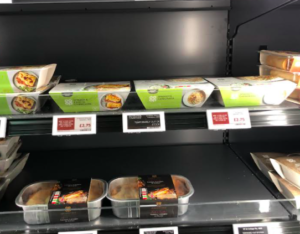First published in the Sunday National, August 1 2021
Supermarket staff are being told to “overface” – move sparse goods to the front of shelves, some customers are becoming upset and frustrated as shortages continue, and experts say meat and fish prices are set to increase significantly.

‘overfacing’ – spreding items across the display
Scotland’s meat-processing plants are struggling to replace EU staff who have left while others are also self-isolating. Less beef and lamb is being imported from the EU thanks to Brexit-related paperwork and delays. This will add to upward pressure on prices.
Transport costs are also increasing as shops such as Tesco offer higher pay to attract replacement drivers after Brexit led to a mass exodus of Europeans. Farmgate prices for beef and lamb in Scotland are already 15% to 30% above the five year average. All that is squeezing margin, which will eventually be reflected in the shop prices, said Iain Macdonald, senior economics analyst at Quality Meat Scotland.
“There is a lot of discussion in the meat-processing sector in Scotland about the difficulty of finding staff. They were heavily reliant on European staff and a lot of them have left. They are just not able to replace them,” he said.
“Transport costs are increasing – road hauliers are having to pay higher wages. At the farm gate, we are seeing prices for beef and lamb going up. The supermarkets’ margins are being squeezed and we would anticipate prices will start to increase in the shops.”
Britain’s main source of imported beef is Ireland “they export more beef to the UK than Scotland produces all together.” More border checks for imports from the EU into the UK are scheduled to start in October. “Irish producers will probably explore selling more of their beef to the EU,” Macdonald predicted. Ireland usually sells 47% of its beef to the UK – but in the first six months of 2021 that fell to 42%. Irish beef exports to EU member states rose by more than 16% at the same time, according to the Irish periodical Farming Independent.
Macdonald said farmers have concerns about the potential long-term impact of a trade deal with Australia – but in the short term beef imports are unlikely to increase from there anyway: “Australia is coming through a drought. Also demand for beef from China is strong and growing.”
Fishermen won’t be allowed to catch as much of the fish that Scots typically eat, such as cod, which will also affect prices. Andrew Locker, the director of the family-run business Lockers Trawlers, which operates two fishing boats out of Peterhead in Aberdeenshire, said: “We used to swap quota we didn’t want with quota the French or Germans didn’t want and that enabled us to put together an annual fishing plan. This year we’re going to be woefully short of the amount of saithe, hake and cod we can catch.
A supermarket worker in Edinburgh’s Scotmid said: “The shortages are definitely getting worse. We are ‘overfacing’ a lot of shelves – at the back they are empty but we bring what we do have to the front and spread it across the gaps. It just makes the place look better.
‘‘It started with just a few gaps in the fruit and veg area but it is pretty much all through the shop now. Some people are getting upset and frustrated. Our own brand of meaty cat food is good value for money and people come in for it but we don’t have any at all.”
In Sainsbury’s, a worker said: “There are quite a lot of gaps. There isn’t the usual range. We fill a few boxes with the same item, whatever we happen to have. Most people just seem to accept that they might not be able to buy exactly what they want. As long as we have plenty of toilet rolls and alcohol, they are mostly OK. Nobody is going to riot because there aren’t any aubergines, But some people do get really angry. A guy threatened me the other day because there wasn’t any mince. We had to ask him to leave. The other thing that has been getting people upset is the follow-on baby milk – people just buy the whole lot because they don’t want to run out.”
As well as Brexit-related issues affecting Scotland and the rest of the UK, there are warnings of an underlying rise in commodity prices which will affect other goods. The Grocer reported this weekend that consumer goods giant Reckitt Benckiser is warning of price increases, as is Unilever.
